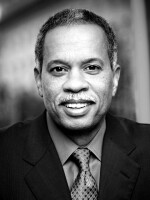RENEE MONTAGNE, host:
And as John McCain has revived his presidential fortunes, other well-known Republicans have seen their prospects dim. Most notable among them, former New York Mayor Rudy Giuliani. Giuliani still leads in most national polls that measure presidential preference among Republicans but barely he seen a standing drop dramatically so much so that the former governor of Arkansas, Mike Huckabee, has pulled to within a few percentage points.
Joining us to talk about the outlook for the national front-runner is NPR news analyst Juan Williams.
Good morning.
JUAN WILLIAMS: Good morning, Renee.
MONTAGNE: First, just briefly, how much ground has Giuliani lost since his high point earlier this year?
WILLIAMS: Well, you can measure it in the polls, Renee. CBS/New York Times poll had him at 38 percent in August. Then he was on the high 20s - 29, 28 percent in October. And now here we are in mid-December, and he's down to 22 percent. That number is close to his average in all the national polls down the last two weeks.
He sustained - he had a lead in the Republican race running as the hero of 9/11, the man who stood tall, strong anti-terror leader. And top GOP fundraisers and all the like appeared closed to embracing him despite his socially liberal positions on abortion, immigration, but he never closed the deal. And the dynamic has shifted under that magic-carpet ride that he was taking above the socially conservative voters in the party.
MONTAGNE: Well, Giuliani hadn't really put in much effort in Iowa, and isn't likely to even show there, but what about the other early states?
WILLIAMS: Well, right now, it looks like it's possible that he's doing so badly, he could not win any of the first six Republican events, Renee, you know, in states like Iowa and New Hampshire. Right now, he's a nonfactor in Iowa. He's running third in New Hampshire, even worse in South Carolina.
So what you're looking at is that you're going all the way up to Florida, and it's a really, you know, when he started out the strategy indicated that because of a strong national lead he had that the early states wouldn't matter. Now it looks like this is a very tenuous, if not totally flawed, strategy.
MONTAGNE: You know, Juan, you just mentioned the magic-carpet ride above socially conservative Republicans. Why this plunge in the polls now when Giuliani - apparently, those negatives that he apparently had - would have had with Republicans really didn't stop him from staying on as a front-runner for quite a long time?
WILLIAMS: Well, you know, couple of things had happened here, Renee. One of them is that the rise of Mike Huckabee. And I don't know if it's directly related but, obviously, Huckabee has captured those socially conservative voters. As we've seen Senator Brownback leave the race, the socially conservative voters have consolidated behind Huckabee. But the second thing to say is that Rudy Giuliani has his own set of problems.
This morning's Washington Post, for example, features a story on the front page about Giuliani's former police commissioner in New York, Bernie Kerik, and one of Kerik's close friends, a man by the name of Lawrence Ray, who was best man at one of Kerik's weddings. And what you see is that while Kerik now is - has pleaded guilty to state ethics charges - he's under federal indictment - he's also tied Kerik as - much of Giuliani lending money to Kerik. All of that has led a sense of trouble or problems to the - and potentially future problems to Giuliani's campaign.
And also there's a story about New York City having to pay for security guards to follow the former Mayor Giuliani around while he was having an affair with a woman who is now his wife. All of this has tainted his campaign.
MONTAGNE: Of course, these negative stories - some like these negative stories were out for a bit. What - you're saying they're sticking now a little bit.
WILLIAMS: I think they're sticking, and I think that they built up to the point where they've had a cumulative effect on a campaign that was, as I said, on a magic-carpet ride above all the static and also now dealing with the fact that Mike Huckabee has apparently become the favorite of social conservatives.
MONTAGNE: Well, we'll continue this conversation another time. Of course, Juan, thanks very much.
WILLIAMS: You're welcome, Renee.
MONTAGNE: NPR news analyst Juan Williams.
Our coverage of the 2008 presidential contest also continues online where you'll find updates from key early state and an interactive primary map at npr.org/elections. Transcript provided by NPR, Copyright NPR.






